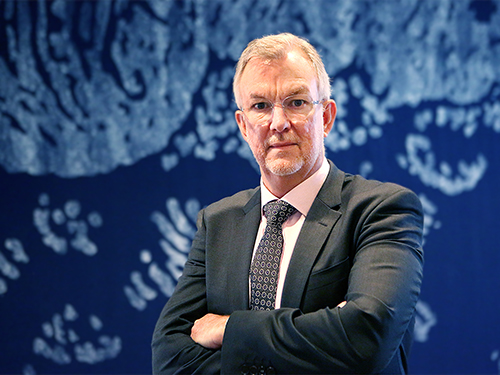By Molly A. Seltzer

When Chris Greig’s time at Princeton as a Gerhard R. Andlinger Visiting Fellow in Energy and the Environment came to a close, he faced a critical juncture in his career. On the table were opportunities for Greig to continue running the Dow Centre for Sustainable Engineering Innovation at the University of Queensland (UQ) in Australia, return to industry to run major clean energy and infrastructure projects, or move to North America to join Princeton with an appointment at the Andlinger Center.
“In the end I thought, if I retired not having taken on this challenge, I might regret that forever. I didn’t want to wonder what might have been had I gone to Princeton,” said Greig.
Greig, who calls himself a “somewhat unconventional academic,” found the offer to join Princeton hugely gratifying and an enormous honor, although quite daunting. According to Greig, the challenge is two-fold. One challenge is to increase ambition among individuals, the business sector, and governments to respond to climate change and work out how to execute an energy transition at a pace and scale that leads to desired climate outcomes. A second challenge, he said, is making a mark that changes things in the world and through that effort, leaving his stamp on a top-tier university. Greig, who was also the founding director of the UQ Energy Initiative, is appointed the Theodora D. ’78 and William H. Walton III ’74 Senior Research Scientist, effective August 1, 2020.
The main thrust of his work at Princeton will be to advance the Rapid Switch initiative. Rapid Switch is a global research network focused on identifying and overcoming the most critical bottlenecks to decarbonization, which Greig initiated at UQ and is now helping to lead at the Andlinger Center. For the Andlinger Center, Chris will further energize its interdisciplinary mission.
“Chris has rallied and brought together faculty and researchers across disciplines, including psychology, political science, engineering, and ecology and evolutionary biology to address the global energy challenge,” said Yueh-Lin (Lynn) Loo, director of the Andlinger Center for Energy and the Environment. “He brings strong business acumen and much-needed financial expertise to address the complexities of energy transitions,” said Loo, who is also the Theodora D. ’78 and William H. Walton III ’74 Professor in Engineering and a professor of chemical and biological engineering.
Rapid Switch was launched at an inaugural workshop at the center in June 2019. The fundamental concept of Rapid Switch is to determine how to practically execute rapid technological change to solve global sustainability problems. The research aims to identify and help to resolve key technological, industrial, financial, and social constraints to achieving rapid, deep decarbonization. The researchers hope to answer critical questions such as what to do about hundreds of billions of dollars recently invested in new coal plants in developing nations, which are intended to operate for at least another 30 years, but from a climate perspective, might need to be retired early; how to mobilize the capital needed for the transition; and how to assure the global capacity in engineering services and industrial supply chains to deliver the transition.
When asked about how he will measure the success of this next chapter, he said, getting everyone –innovators, industry, and policymakers – on the same page moving collaboratively toward realistic decarbonization goals would be the ultimate marker of his achievement. He wants stakeholders to consider practical questions like, “what’s the appropriate timeframe and pathway for achieving net-zero emissions – for different sectors and nations?”
Bob Williams, a senior research scientist, emeritus, of Princeton’s Energy Systems Analysis Group, has collaborated with Greig since 2013 and spoke to Greig’s deep understanding of how projects get off the ground and how decisions are made in industry. He said Greig’s experience working on a large coal plant with carbon capture and storage was invaluable to Williams’ study on a biomass project with carbon capture. Williams said Greig’s knowledge helped to inform energy models and cost estimates, and was also critical to securing funding from the U.S. Department of Energy for the study.
“Greig is a bridge between two key worlds – academia and industry. On the one side, we have the hard science on energy transitions and energy systems modeling, and on the other, the capital, management experience, and physical infrastructure assets and the people behind them, who can use this new knowledge for good and make decisions based on the latest science,” said Loo. “Greig’s research and Rapid Switch are important examples of much of the work we aim to do at the Andlinger Center – that which will make a real impact and can be used by those who need this information today,” said Loo.
Because the Andlinger Center focuses on high-impact research in energy and the environment, Greig said, it is a “great home” for Rapid Switch. He also spoke to the importance of an interdisciplinary lens for research and problem solving, which is a foundational principle of the center. “The challenges facing deep decarbonization require scientists, engineers, social scientists, and others, and the Andlinger Center brings these experts together,” he said.
Between the opportunity to teach the next generation of leaders, the intellectual environment, and the possibility for change through one of the most influential and well-funded institutions in the world, Greig decided to make the move to Princeton. Most importantly, he thought he’d really enjoy it.
“We all like a challenge.”
Read more about Greig’s work and the Rapid Switch initiative at www.acee.princeton.edu/rapidswitch
Relevant stories:
New fellow to lead effort investigating pace of international energy transition